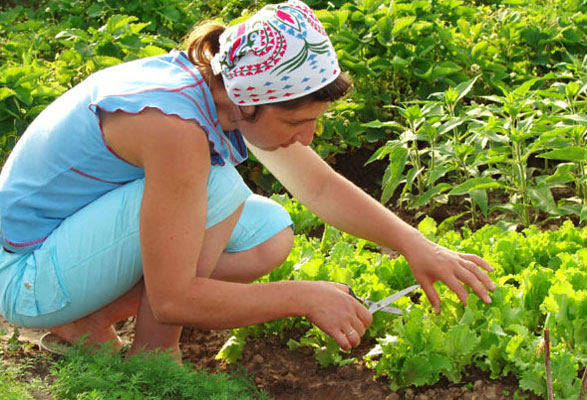Follow these basic body mechanics tips for gardening safely!
Gardening season is here! We want you to enjoy the outdoors without injuring yourself. Once the weather gets nice it is easy to get overzealous and spend hours in the garden without noticing an aching back or neck until it’s too late. But don’t worry, just because you have a long ‘to do’ list doesn’t mean you have to suffer the consequences. By planning ahead and being smart about your body mechanics you can help prevent soreness and injuries. Follow these easy tips for staying healthy throughout the gardening season:
Lift properly to protect your back.
Remember to bend your knees and engage your core muscles; use your leg muscles to squat and don’t bend with your back.
- Avoid lifting and twisting through your back – instead keep the load close to your body and pivot your feet and trunk together
- Avoid carrying heavy loads on 1 side of your body – balance it out on both sides or lighten up the load and take more trips. Also consider getting help for heavy lifting – you can’t do it all!
Maintain good posture.
Position yourself close to the task at hand to avoid awkward reaching and twisting. Try to keep your back straight and head in a neutral position so that you are not looking up or down for extended periods of time.
- Use stools, chairs, or knee pads whenever possible to help maintain good neck and back posture.
- When pushing a wheelbarrow or lawnmower keep your back tall and head up. Also bend your knees and engage your core muscles to optimize your power and protect your spine.
- Take mini-breaks to stretch and correct your posture – try squeezing your shoulder blades together, or contracting your deep abdominal (TA) muscles.
Use Proper Tools to Reduce Strain
- Use knee pads for kneeling and avoid sustained squatting. This will give your knees, hips, ankles and back a break.
- Use a step stool or tools with extended handles to make overhead work easier. Bring yourself closer to your task to avoid awkward reaching and reduce neck and shoulder strain.
- Use tools with good grips or ergonomic handles to reduce fatigue on your hand and forearm muscles. Ensure they are a comfortable fit for your hand size.
Prevent Repetitive Strain Injuries
Doing the same task over and over will put excessive strain on certain body parts and muscle groups, leading to pain and injury. Here are some self-management tips to help avoid RSI’s:
- Change positions frequently to avoid stiffness and strain on certain body parts. For example try raking on both sides.
- Alternate tasks to add variety to your body movements and avoid static postures or repetitive lifting. For example do 10 minutes of weeding followed by 10 minutes of pruning.
- Take breaks to stretch and hydrate. It is important to give your body some time to recover, and adding these mini-breaks can help improve your work endurance and efficiency.
- Don’t overdo it! Create a realistic plan ahead of time so that you aren’t trying to get all your tasks done in a single day or weekend. Plan to spread your workload out over several days or weeks to avoid overuse injuries.
- Never work through pain. Listen to your body and stop when you are getting tired or sore. The task will still be there the next day or week!
Keep your body limber
- Warm-up before gardening with some light walking or gently swinging your arms and legs. This helps increase your heart rate and gets blood flowing to the muscles so they are ready to work.
- Take stretch breaks. Do some of your favourites and try to target all your major body parts – neck, shoulders, back, and legs. This will keep you feeling loose and flexible and prevent muscle tension from building up. Move slowly and hold each position for approximately 10-15 seconds.
- Cool-down. An easy walk around the yard and some gentle stretching will help relieve tension after your work and prevent muscle stiffness.
We hope these tips help keep you active, healthy, and pain-free throughout the spring and summer. If you have any lingering pain or specific concerns please do not hesitate to book an appointment for a one-on-one session with one of our physiotherapists. We will be able to assess and diagnose your injury, as well as provide hands on treatment and a therapeutic exercise program to address your specific needs.

